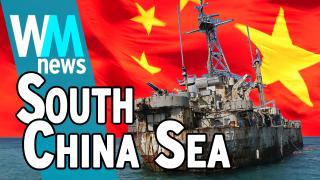10 Chinese Economy Facts - Meltdown or Slowdown? - WMNews Ep. 36

As the Chinese stock market plummets in the summer of 2015, economists around the world wonder whether or not it will be able to recover. Welcome to WatchMojo News, the weekly series from http://www.WatchMojo.com where we break down news stories that might be on your radar. In this instalment, we're counting down 10 crucial facts you should know about the Chinese economy.
#10: What Is China’s Current Market Situation? The Current Condition
10 South China Sea Dispute Facts - WMNews Ep. 54
China is the world’s fastest growing economy, as well as the world’s second-largest economy, with an annual gross domestic product of over $11 trillion dollars, trailing the U.S., which generated about $17 trillion in 2013. Throughout the first half of 2015, China saw a dive in its overall trade, with imports falling as China attempted to steer its economy from one constructed on a high growth through big investment to one that is consumer-based. By July 2015, Shanghai stocks had plunged more than 30% and Chinese companies had lost $3.9 trillion in value; that’s 15 times the size of Greek economy, whose economic woes had received much more media attention during the same period.
#9: How Has China’s Economy Evolved? The Birth of China’s Modern Economy
Although China currently holds the position as the world’s second largest economy, it only began to rapidly grow beginning in the early 1920s, and that, despite numerous wars and economic instability. It suffered an economic downturn during the Great Leap Forward, which ran from 1958 to 1961. Led by Mao Zedong (tse-dung), the founding father of the People’s Republic of China, this campaign embodied the rapid transition from an agrarian economy to a socialist one. This was to be achieved through an increase in industrialization and collectivization in order to encourage the sharing of agricultural tools and animals. Unfortunately, it led to the Great Chinese Famine, in which up to 45 million people died as a result of the radical change in agricultural practices, the lack of economic management and the persecution of those who refused to adhere to the campaign’s priorities and enforced policies.
#8: How Has China’s Economy Evolved? Part II The Evolution of the Chinese Economy
China’s economic reform began in the late 1970s with first stage introducing foreign investment, the decollectivization of the agricultural sector and the development of entrepreneurial businesses. The later stage of reform began in the late 1980s and included the privatization of state-owned industries and the reform of protectionist policies and regulations. This launched unprecedented economic growth, with China creating multiple special economic zones within the country, thereby enabling foreign investment within these areas. Between 1978 and 2013, China’s gross domestic product increased around 10.5% annually, leading the country to become an engine of economic growth, both regionally and worldwide.
#7: Who Invested in the Stock Market? The Middle Class
10 Middle East Arms Race Facts - WMNews Ep. 26
In 2014, the Chinese government encouraged investing in the stock market and made the prospect more enticing by relaxing borrowing limitations and facilitating investing. This caused widespread investment by the middle class and novice investors and led the Shanghai market to grow by more than 150%. Over two thirds of new Chinese investors had never graduated from high school and most took on debt in order to invest. So the 2015 stock market tumble has led many casual investors to fear investing in stocks again, and could lead the overall population to question the ruling communist government and their handling of the markets.
#6: How Has China’s Housing Market Grown? The Housing Bubble
10 Tech Bubble Facts - WMNews Ep. 29
China experienced a real estate and property bubble from 2005 to 2013 that saw average housing prices in the country increase between 10 and 15% annually. Property developers continued to build commercial and residential properties despite the fact that there were an estimated 64 million vacant apartments. The country is filled with ghost towns and malls that remain largely unoccupied. For example, in 2005 China opened the world’s largest mall, the New South China Mall, yet it remained a “dead mall” with a less than 10% occupancy rate for years. The housing market issue was further exacerbated by the fact that lower income individuals were buying homes valued at 8 times their annual income. For context, the guideline for property buying in the United States is three times your annual income. Yet there may be hope that the housing market is slowly recovering, as it posted growth in national property sales for the first time in 15 months in April of 2015. This is especially important for the Chinese economy, as housing and construction accounts for as much as 30% of the country’s gross domestic profit.
#5: What Has China Done to Stem the Stock Market Free Fall? The Bans
Since November of 2014, the Chinese government has cut interest rates four times, and has reduced the amount of cash that banks are allowed to hold in order to push lending. More than 50% of the companies listed on the Shanghai and Shenzhen composite indexes, where China’s mainland stock exchanges occur, have filed for a trading halt in an attempt to stop the losses. As of July 2015, in order to stop the plummeting of the Chinese stock exchange, the government has imposed harsh restrictions on listed company shareholders and managers. Furthermore, those shareholders or managers who own over 5% of a company’s shares will not be able to sell their shares for 6 months. The government has also restricted new initial public offerings for companies hoping to launch themselves onto the stock exchange.
#4: How Is China’s Stock Market Different from the West? The Development
The Chinese stock market is relatively new, as its two main stock exchanges only began operating in the 1990s. This is in stark contrast to the New York Stock Exchange. This American stock exchange, which was founded in 1817, is the world’s largest stock exchange and has a daily trading value of over $169 billion. The Shanghai and Shenzhen stock exchanges are independently operated in the People’s Republic of China, or Mainland China. The Hong Kong Stock Exchange and the Taiwan Stock Exchange are also part of the Chinese Stock Exchanges, despite the fact that they are not in Mainland China territory. Furthermore, those who trade in the Chinese market are typically ordinary people, whereas in the United States, institutional investors perform the majority of the transactions. Finally, unlike the United States, China’s stock market is insulated and not inextricably tied to the country’s overall economy. About 6 percent of Chinese households have stock investments, whereas over half of American households hold stocks in their investment portfolios.
#3: Is the Potential Chinese Stock Market Crash Important? The Great Depression
Economists have drawn stark comparisons between the 2015 economy of China and the economy of the United States starting in 1929, as this period marked the beginning of the Great Depression. The Great Depression was a global economic depression that lasted for nearly a decade and saw both poor and rich countries loaded with high unemployment, increased poverty, failed banks and widespread homelessness. In order to combat the 2015 Chinese stock market free fall, a group of 21 Chinese brokerage firms pledged on July 4th, 2015 to commit nearly $20 billion to a stock fund in order to stabilize the shares. This plan eerily mirrors the actions of 1929, when five of America’s most influential financiers met on Wall Street and constructed a plan to pool resources to stave off a fall in stock prices. The plan soon failed, however, and led the Dow Jones to severely drop and launch the Great Depression.
#2: Could the Potential Crash Affect the World Economy? The Second Largest Economy
Due to the fact that Mainland China has limited the amount of stocks a foreigner is allowed to purchase, the possibility of contagion outside of China if the market were to continue its downward spiral would be minimal. According to the Bank of America, foreign investors own less than 1% of Mainland China’s stocks. Yet a stock market crash could still have an impact on the world, as China is home to the second largest economy and its consumers. For example, Chinese consumers represent a boom for overseas companies as they spend more on travel than any other country and they purchase 12% of the world’s luxury goods. This could soon disappear as consumers are forced to restrict their spending in the future.
#1: Is This a Slowdown or a Meltdown? The Future
10 Net Neutrality Facts - WMNews Ep. 17
Despite the plunge in the stock market and the decline in the real estate property sector, the Chinese economy continues to grow at a rate that outpaces the rest of the world. Yet it cannot afford the burst of a stock market bubble, as its property market remains depressed, and the country’s corporate and local governments hold debt that amounts to more than 280% of the country’s GDP! The world has largely relied on China to prop up the economy as it still recovers from the global financial crisis of 2008. This latest perceived market bubble could be the nail in the Chinese economic coffin and could lead to a total market meltdown. Or it could simply lead to a slowdown as the government transitions to a more efficient economy – but only time will tell.





